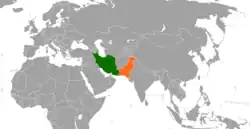Pakistan in the Iran–Iraq War
During the Iran–Iraq War (1980–1988), the foreign policy of Pakistan played a complex role in the war.[1]

According to the national security experts, the role of Pakistan in the war, however, was based more on maintaining a delicate balance.[2] During the conflict, Pakistan sought to portray as strictly "neutral" but cultivated friendly relationship with Iran.[3][4] In a state visit paid by Pakistani President Muhammad Zia-ul-Haq to the United Kingdom in the mid-1980s, he correctly predicted that the conflict "will end up in a military stalemate".[4]
Overview
The Pakistani military initiated a covert regime change action under Chief of Army Staff General Zia-ul-Haq and Chief of Naval Staff Admiral Mohammad Shariff by imposing martial law in all of the country in 1979. In 1980, the Iranian Revolution, led by Ayatollah Khomeini, evoked a strong reaction throughout the Muslim world. The spillover of the revolution worried the Arab world, as well the military government of Pakistani President General Zia-ul-Haq.
His religiously-influenced military government provided a rare opportunity, and the political change in Pakistan and the Islamic Revolution in Iran suited well to both countries and so no diplomatic or political rift occurred between them.[5] Responding swiftly to the great revolutionary change, Pakistani Foreign Minister Agha Shahi immediately paid a state visit to Tehran and met Iranian Foreign Minister Karim Sanjabi on March 10, 1979.[5] Both countries expressed confidence by stating that they would march together to a brighter future.[5] The next day, Agha Shahi held talks with Ruhollah Khomeini in which developments in the region were discussed.[5]
On 11 April 1979, Zia famously declared, "Khomeini is a symbol of Islamic insurgence".[5] Reciprocating President Zia's sentiments, Imam Khomeini in his letter called for Muslim unity[5] and declared, "Ties with Pakistan are based on Islam."[5] By 1981, Zia-ul-Haq was close allies with the United States again and came under the latter's sphere of influence for a long time.[5]
In 1980, Iraqi President Saddam Hussein decided to invade Iran.[2] Reportedly, Pakistan also began to supply conventional weapons to Iran, and both neighbours supported the Afghan jihad against the Soviet Union but different factions of the resistance.[2]
Military assistance and co-operation increased in support to Iran, and Pakistan never openly supported Iraq during the Iran-Iraq War despite tremendous pressure from the United States and Saudi Arabia.[6] There are reports of Pakistan financially helping Iran at the operational level.[6] The Pakistani military officials strongly objected killing of Iranian pilgrim riot by the Saudi Arabian Army on the annual Hajj pilgrimage to Mecca in 1985.[1] Conversely, Pakistan exported and sold numbers of Chinese and US weapons to Iran, specifically the Silkworm and Stinger missiles which proved to be a crucial integrating factor in the Tanker War; they had originally been bounded for the Afghan mujahideen against the Soviets.[7]
References
- Shah, Mehtab Ali (1997). The foreign policy of Pakistan : ethnic impacts on diplomacy, 1971-1994. London [u.a.]: Tauris. ISBN 1860641695.
- Ansar, Arif (January 27, 2013). "Preventing the next regional conflict". Pakistan Today. Retrieved 20 October 2013.
- ELAINE SCIOLINO, Special to the New York Times (November 1, 1987). "U.S. Sees 'Troubling' Tilt by Pakistan to Iran". The New York Times. Retrieved 20 October 2013.
- "Zia Ul-Haq On The Iran/Iraq War". BBC World. Retrieved 20 October 2013.
- Officials. "Pak-Iran Relations Since Islamic Revolution: Genisis [sic] of Cooperation and Competition". Government of Iran. Embassy of Iran, Islamabad. Archived from the original on 10 April 2013. Retrieved 25 November 2012.
- Allam, Shah (October–December 2004). "Iran-Pakistan Relations: Political and Strategic Dimensions" (PDF). Strategic Analysis. The Institute for Defence Studies and Analyses. 28 (4): 526. doi:10.1080/09700160408450157. S2CID 154492122. Retrieved 20 October 2013.
- Mir, Furrukh (2011). Half Truth. [u.s.]: iUniverse. ISBN 978-1450286459.